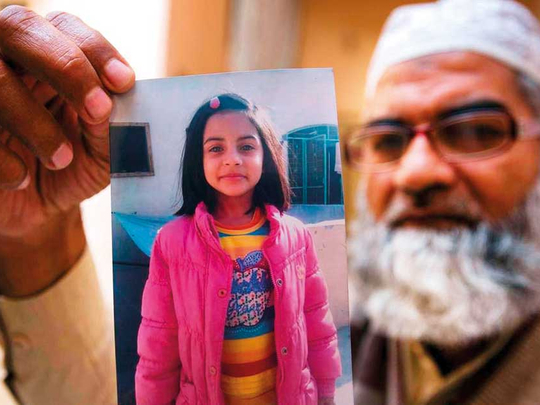
Islamabad: Pakistan’s Supreme Court has upheld a death sentence for a man who killed eight children, including a 8-year-old girl whose rape and murder drew nationwide condemnation earlier this year.
Tuesday’s court order came months after Imran Ali challenged his death sentence following sentencing in February, claiming his trial was not fair. He still has the right to seek clemency from President Mamnoon Hussain.
Imran was arrested in January after he raped and killed Zainab Ansari and threw her body into a garbage dump in the city of Kasur in eastern Punjab province.
A three-member bench headed by Justice Asif Saeed Khan Khosa and comprising Justice Manzoor Ahmad Malik and Justice Syed Mansoor Ali Shah announced the reserved verdict.
The bench stated that “as regards the sentences passed by the trial court against the petitioner which sentences had subsequently been upheld and confirmed by the High Court Lahore, we may observe that the crimes committed by the petitioner were absolutely horrendous and barbaric and the same had been committed with a minor and innocent girl aged about 7/8 years.”
“The petitioner had not only deceitfully kidnapped her but had also brutalized her by committing sodomy and rape with her and had then ultimately killed her mercilessly. In his pleading guilty to the charge as well as in his statement recorded under section 342, Cr.P.C. the petitioner had admitted committing similar offences with eight other minor victims and in that backdrop the petitioner did not deserve any sympathy in the matter of his sentences. This petition is, therefore, dismissed and leave to appeal is refused” the apex court maintained.
For kidnapping, sodomizing, raping and murdering a minor girl namely Zainab Amin, aged about 7/8 years, the petitioner was booked in case FIR No. 8 registered at Police Station A-Division, Kasur on 04.01.2018 and after a regular trial he was convicted by the trial court for offences under sections 364-A, 376, 377, 302(b) and 201, PPC and section 7(a) of the Anti-Terrorism Act, 1997 and for some of the above mentioned offences he was sentenced to death apart from some other sentences passed against him.
The petitioner challenged his convictions and sentences through an appeal which was dismissed by the High Court and all his convictions and sentences recorded by the trial court were upheld and confirmed. Hence, the present petition before the Top Court.
The bench have heard the learned counsel for the petitioner and the learned Additional Prosecutor-General, Punjab appearing for the State and have gone through the record of the case with their assistance.
It has straightaway been noticed by Supreme Court that when the charge was framed by the trial court against the petitioner, he had pleaded guilty as charged and on that occasion he had got recorded a detailed confessional statement wherein he had admitted almost every aspect of this case alleged against him.
Despite such pleading guilty to the charge and making of a confessional statement by the petitioner the trial court had decided to proceed with recording of evidence and during the trial statements of as many as 32 prosecution witnesses were recorded and many other pieces of evidence were brought on the record.
In his statement recorded under section 342, Cr.P.C. the petitioner had once again admitted almost all the vital pieces of evidence produced by the prosecution against him as correct and had once again admitted his guilt unreservedly.
The bench have observed that even in his arguments addressed before the trial court the learned counsel for the petitioner had only prayed for some lenience to be shown to the petitioner in the matter of his sentence and no argument had been advanced before the trial court challenging the merits of the prosecution’s case against the petitioner.
It was further observed that in his memorandum of appeal filed by the petitioner before the High Court once again only lenience in the matter of sentence had been prayed for by the petitioner without questioning his convictions recorded by the trial court.
It was for the first time during the arguments before the High Court that the learned counsel for the petitioner had maintained that admission of guilt by the petitioner before the trial court was a result of coercion but during such arguments he had not provided any detail regarding coercion applied against the petitioner so as to extract a confession.
In paragraph No. 4 of the memorandum of the present petition filed before this Court it has been maintained by the petitioner that the confession made by him was a result of duress and inducement but in paragraph No. 10 of this very petition the petitioner has, once again, admitted his involvement in the alleged offences in clear and categorical terms. Apart from pleading guilty to the charge and making a confession by the petitioner there were many pieces of evidence brought on the record by the prosecution which proved every word of the confession to be correct and in that regard we may refer to the CCTV footages, photographs, DNA tests and the medical evidence which had confirmed every aspect of the confession made by the petitioner.
All such pieces of evidence have convinced us that the confession made by the petitioner was not only voluntary but also true. After proper assessment and evaluation of the evidence available on the record both the courts below had concurred in their conclusion regarding guilt of the petitioner having been proved to the hilt and upon our own independent evaluation of the evidence available on the record we have found no occasion to take a view of the matter different from that concurrently taken by the courts below.












